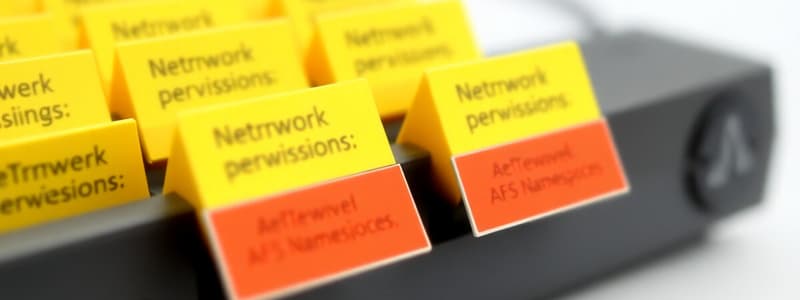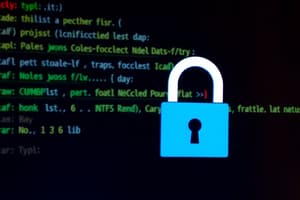Podcast
Questions and Answers
What is the primary purpose of a network directory service?
What is the primary purpose of a network directory service?
- To store information about a computer network (correct)
- To encrypt files for security
- To increase file transfer speed on local devices
- To grant permissions for local files only
How many standard permissions are available for NTFS files?
How many standard permissions are available for NTFS files?
- 8
- 5 (correct)
- 6
- 4
Which NTFS permission allows a user to view and open files in a folder?
Which NTFS permission allows a user to view and open files in a folder?
- Read (correct)
- Full control
- List folder contents
- Write
What happens to permissions if they are not explicitly set on a subfolder?
What happens to permissions if they are not explicitly set on a subfolder?
Which statement about effective permissions is true?
Which statement about effective permissions is true?
When are Share permissions applied?
When are Share permissions applied?
What can be done to disable permission inheritance in NTFS?
What can be done to disable permission inheritance in NTFS?
What is the function of DFS Namespaces in Windows Server?
What is the function of DFS Namespaces in Windows Server?
Which permission is NOT a standard NTFS permission for folders?
Which permission is NOT a standard NTFS permission for folders?
What does DFS Replication primarily replace as the replication engine for DFS namespaces?
What does DFS Replication primarily replace as the replication engine for DFS namespaces?
Which algorithm does DFS Replication use to optimize the replication of changed data?
Which algorithm does DFS Replication use to optimize the replication of changed data?
What must be established among members in a DFS Replication group for folder synchronization?
What must be established among members in a DFS Replication group for folder synchronization?
How does adding multiple replicated folders within a single replication group simplify management?
How does adding multiple replicated folders within a single replication group simplify management?
Which Windows Server version utilizes DFS Replication for sysvol folder replication?
Which Windows Server version utilizes DFS Replication for sysvol folder replication?
What is the purpose of the Dfsradmin.exe tool in DFS Replication?
What is the purpose of the Dfsradmin.exe tool in DFS Replication?
What is the function of a namespace server in DFS Namespaces?
What is the function of a namespace server in DFS Namespaces?
Which of the following correctly describes a folder target in a DFS Namespace?
Which of the following correctly describes a folder target in a DFS Namespace?
Which namespace is indicated by the path \Contoso\Public?
Which namespace is indicated by the path \Contoso\Public?
What happens when a user accesses a folder that has folder targets?
What happens when a user accesses a folder that has folder targets?
What is required to ensure proper access control in DFS Namespaces?
What is required to ensure proper access control in DFS Namespaces?
When using multiple namespace servers, what is crucial regarding Namespace Share permissions?
When using multiple namespace servers, what is crucial regarding Namespace Share permissions?
What does the term 'referral' refer to in the context of DFS Namespaces?
What does the term 'referral' refer to in the context of DFS Namespaces?
In a DFS Namespace, what is the role of folders without folder targets?
In a DFS Namespace, what is the role of folders without folder targets?
Which of the following options accurately describes a characteristic of a domain-based namespace?
Which of the following options accurately describes a characteristic of a domain-based namespace?
What is the impact if namespace share permissions are not identical on additional namespace servers?
What is the impact if namespace share permissions are not identical on additional namespace servers?
Flashcards
Network Directory Service
Network Directory Service
A service that stores information about a network and provides tools for managing it. It allows users to find and access network resources.
NTFS Permissions
NTFS Permissions
Security settings that control access to files and folders on a Windows system, allowing you to grant or restrict access for specific users and groups.
What are the six standard NTFS permissions?
What are the six standard NTFS permissions?
Read: Allows viewing file contents, Read & Execute: Allows viewing and running files, List folder contents: Allows viewing folder contents, Write: Allows modifying file contents, Modify: Allows modifying both file contents and permissions, Full control: Allows all access and permission modifications.
Explicit Permission
Explicit Permission
Signup and view all the flashcards
Inherited Permission
Inherited Permission
Signup and view all the flashcards
Effective Permissions
Effective Permissions
Signup and view all the flashcards
DFS Namespaces
DFS Namespaces
Signup and view all the flashcards
Share Permissions
Share Permissions
Signup and view all the flashcards
Most Restrictive Permission
Most Restrictive Permission
Signup and view all the flashcards
What is DFS Replication?
What is DFS Replication?
Signup and view all the flashcards
What is RDC?
What is RDC?
Signup and view all the flashcards
How does DFS Replication work with AD?
How does DFS Replication work with AD?
Signup and view all the flashcards
What are replication groups?
What are replication groups?
Signup and view all the flashcards
What does a replicated folder do?
What does a replicated folder do?
Signup and view all the flashcards
How do you create more replicated folders?
How do you create more replicated folders?
Signup and view all the flashcards
Namespace Server
Namespace Server
Signup and view all the flashcards
Namespace Root
Namespace Root
Signup and view all the flashcards
Domain-based Namespace
Domain-based Namespace
Signup and view all the flashcards
Folder Targets
Folder Targets
Signup and view all the flashcards
Referral
Referral
Signup and view all the flashcards
DFS Namespace Permissions
DFS Namespace Permissions
Signup and view all the flashcards
Consistent Permissions
Consistent Permissions
Signup and view all the flashcards
Multiple Namespace Servers
Multiple Namespace Servers
Signup and view all the flashcards
Importance of Identical Permissions (Multiple Servers)
Importance of Identical Permissions (Multiple Servers)
Signup and view all the flashcards
Study Notes
CST8200 - Windows Domain Administration
- This course covers Windows Domain Administration
- Instructor: Denis Latremouille
Week 06 Agenda
- File Sharing
- NTFS Permissions
- DFS Namespaces
- DFS Replication
- File Server Resource Manager (FSRM)
- File Share Quotas
- File Screens
File Sharing
- A network directory service stores information about a computer network and offers features for retrieving and managing that information.
- Often used as an administrative tool, but directory services are also used to discover resources.
- Directory services act as a centralized management tool, but careful planning and setup are crucial because of complexity.
NTFS Permissions
- NTFS permissions configure access to folders and files.
- Folders have 6 permissions and 14 special permissions.
- Files have 5 permissions and 13 special permissions.
- Standard permissions include Read, Read & Execute, List folder contents, Write, Modify, and Full control.
- Special permissions manage various tasks like Traverse folder, for example.
NTFS Permission Inheritance
- Explicit permissions are directly granted to a file or folder.
- Inherited permissions are granted to a parent folder and are automatically applied to child folders and files.
- Effective permissions combine explicit and inherited permissions to determine a user's actual access rights.
- By default, initial permissions are set at the root of a volume, and new folders and files inherit those settings, unless you configure them otherwise.
- Permission inheritance can be disabled in the Advanced Security Settings dialog box by clearing the "Include inheritable permissions from this object's parent" option.
- When accessing network shares, the most restrictive permissions between share and NTFS permissions determine effective access.
DFS Namespaces
- DFS (Distributed File System) Namespaces is a role service in Windows Server.
- It groups shared folders on different servers into logical namespaces.
- This creates a virtual view of the shared folders, where a single path can lead to files on multiple servers.
- The namespace server can be a member server or a domain controller.
- The namespace root is the starting point.
- Namespace paths often begin with a domain name (e.g., \Contoso\Public).
- Folder targets represent the UNC paths of the actual shared folders.
- Permissions in namespaces are separate from NTFS permissions, and both need to be configured for proper access control.
DFS Replication
- DFS Replication is a role service that efficiently replicates folders across multiple servers and sites.
- It replicates all folder types, including those in a DFS namespace.
- It's a multiple-master replication engine that keeps folders synchronized even over limited bandwidth.
- It replaces the File Replication Service (FRS).
- It uses a compression algorithm called remote differential compression (RDC) to replicate only changed file blocks.
- Replicated folders are grouped into replication groups, and connections between members define the replication topology. Multiple replicated folders can be in one replication group.
File Server Resource Manager (FSRM)
- FSRM is a role service that allows management and classification of data on file servers.
- It can automatically classify files, perform tasks based on classifications, set quotas on folders, create reports monitoring storage usage.
File Share Quotas
- File Share Quotas manage the space allowed on volumes or folders.
- Quotas can be set automatically on new folders created on a volume.
- Quota templates can also be created and applied to new volumes and folders.
File Screens
- File screens control which types of files can be stored on a file server.
- You can limit file extensions (e.g., preventing MP3 files from being stored in shared folders).
Studying That Suits You
Use AI to generate personalized quizzes and flashcards to suit your learning preferences.




